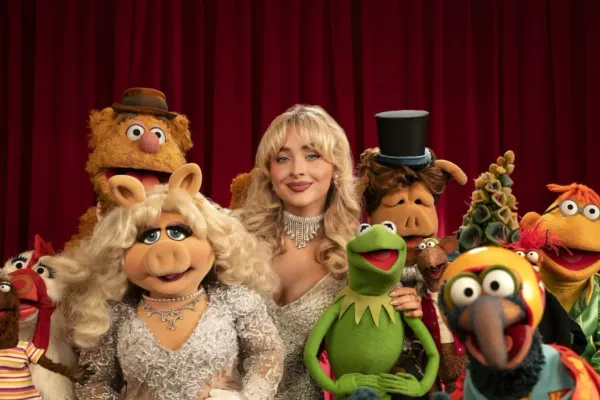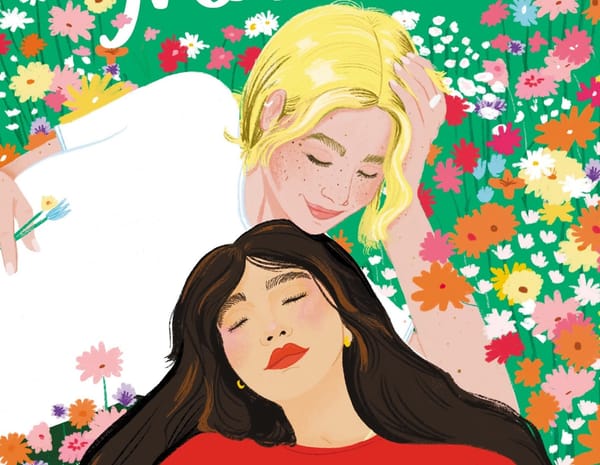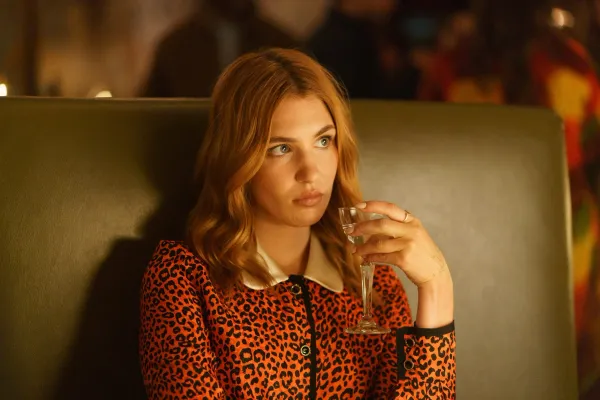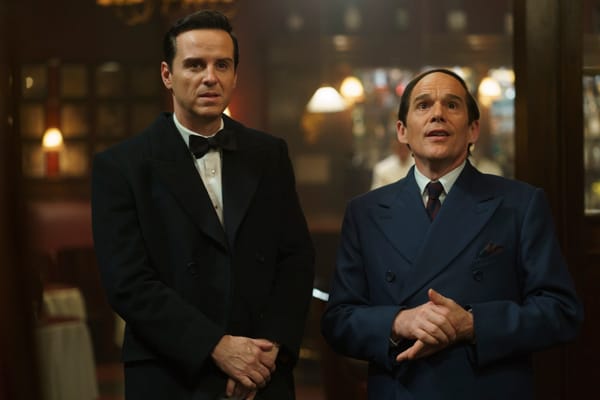Episodes: My So-Called Life's "So-Called Angels"
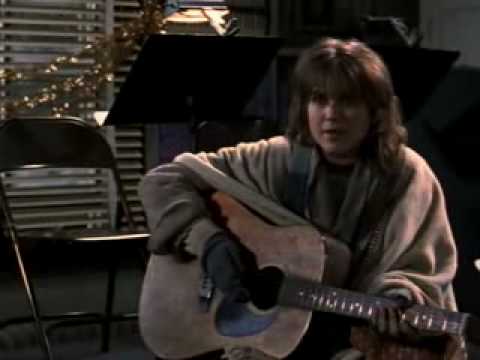
(Yo, this piece originally appeared on Tumblr. I am tired and don't want to write any more.)
The first time I saw “So-Called Angels,” the much-maligned Christmas episode of My So-Called Life, I was but 14, and I thought it was the best episode of television I had ever seen. Indeed, I was so moved by it that I woke my mother up from a dead sleep to tell her all about it. I remember how my voice cracked just a bit when I got to the bit where Patty Chase asked Juliana Hatfield’s homeless, guitar-strumming angel, “When did you die?” (I remember this took me completely by surprise at the time, even though it’s so obvious Hatfield is meant to be an angel). I remember how the final image of the Chase family—plus Ricky and Brian—leaving the church, watched over by Hatfield, who exits the screen with one glimpse of a feathery, luminous wing, struck me as absolutely perfect. I remember being dumbstruck by the episode’s sensitive depiction of teenage homelessness, right alongside angels, something I still so desperately wanted to believe in.
In a way, “So-Called Angels” hit me directly in my sweet spot. Homelessness was a problem I fretted over often as a relatively affluent teenager growing up in the middle of nowhere. I would frequently force myself to cry over the song “That Could Have Been Me” by Christian recording group A Cappella, not because I was genuinely moved by it but because I forced myself to imagine a television episode version of it I constructed in my head, wherein I met a poor homeless kid my own age, learned some valuable lessons from him, then realized that that could have been me, as A Cappella took us home. I cried because I felt like I should, so I placed things in a context where they were all about me. “So-Called Angels” more or less isthat episode of television I imagined, only much better executed than what was in my head (which was more or less a very special episode of Family Matters) and with an angel chaser.
Angels were everywhere in the mid-90s. There were all of these surveys about how this or that many Americans believed in angels, and what did it all mean? They were on the cover of newsmagazines and at the center of one of the most popular TV dramas of the era (yes,Touched By An Angel was legitimately huge there for a while). Buffed up, action movie versions of them were at the center of the seminal Christian fiction books This Present Darkness and Piercing The Darkness, and the popular culture of the era—even the Christian-specific pop culture—was never quite sure how to thread the needle between ultra-masculine he-men and friendly helper buddies who were always there to look out for you, all the while ignoring that the actual angels in the Bible were really fucking weird. (If Angela Chase had encountered a ring of eyes in the sky, then plaintively intoned about how that could have beenher in this episode, it would be the greatest TV episode of all time.)
To be perfectly honest, the angel is the only reason “So-Called Angels” has the reputation it does. Yes, it’s a bit more sappy than your standard My So-Called Life episode, but Christmas episodes earn a certain degree of sap, and executive producers Marshall Herskovitz and Edward Zwick come by their attachment to Christmas sap honestly, having named their production company after It’s A Wonderful Life’s Bedford Falls. The episode, co-written by series creator Winnie Holzman and story editor Jason Katims (on his first big TV assignment), has that smart structure one expects from an episode of this show, where something gets shuffled all the way to the back of the deck before coming out again at episode’s end.
When Graham, learning where Angela has been taken by the police after being rounded up in the raid on the abandoned warehouse that’s accommodating runaway teens, says, “We’re going to church,” it’s a rather thrilling moment, because you suddenly remember all of the discussion about religion among the Chases earlier in the episode, before Ricky’s plight took precedence over everything else. The show was so good at mixing up a bunch of everyday, “that’s life” sorts of occurrences and then bringing them all together via a lovely grace note at the end, and this is just another example of that. Bringing the characters together to listen to a hymn about going home at a church is a little obvious, to be sure, but it’s obvious in a way that works when you see the look on Bess Armstrong’s face when she sees Rickie and, later, her daughter.
The episode also absolutely nails the Rickie subplot. The series was in largely uncharted territory for an American teen drama, as Rickie was the first regular gay character on such a show, one who couldn’t go away after one or two episodes or after teaching the series star a lesson about something. In the hands of Holzman and actor Wilson Cruz, Rickie became someone slowly trying out new sides of a sexuality he didn’t have a lot of role models for. (That Rickie would become one of TV’s most important early gay role models was one of the show’s foremost triumphs.) “So-Called Angels” turns his struggle to find acceptance into the center of a Christmas story. We’re all seeking acceptance and lighting candles in remembrance. Rickie’s just caught in a very real, very terrifying situation that lots of kids his age had been and would be trapped in before and after the show’s run. And in Patty and Graham—who ultimately take the boy in, as you know they must—the series subtly expands the circle of TV human rights. Rickie doesn’t deserve to be punished for who he is, and Graham and Patty realize that. Being uncomfortable with him doesn’t trump the fact that they have a responsibility to him as a fellow human being and a friend of their daughter’s—a big message for the ‘90s.
But then there’s that angel, and the problems of her portrayal extend beyond merely Hatfield’s weird, breathy whisper line delivery, which makes everything she says unintentionally hilarious. Check out the scene where Armstrong is just doing her damnedest to make this bit where Patty has encountered an angel out in the snow work, only she has to deal with Hatfield repeating her line from earlier about feeling like the fight is having you. It’s a nifty turn of phrase—though not one that I totally buy either of these characters (even the supernatural one) would say—but it’s shot down by the fact that it can only really work with Armstrong’s ability to shoot Patty’s brittleness through with warmth. Hatfield just doesn’t have that, and she ends up sounding like a really pretentious 14-year-old poet (and I know from really pretentious 14-year-old poets).
No, the problem with the angel is that it takes a real, serious problem—homeless runaway teenagers, chased out of bad situations in their own homes—and turns it into a Christmas miracle to be “solved.” Patty and Graham taking in Rickie is genuinely heartwarming; it doesn’t really need the angel floating around the edges of the story to work. The shows of Herskovitz and Zwick were ones steeped in yuppie-life realism, in the problems and concerns of the people they knew around them. One of the accidental reasons for MSCL’s success is that Claire Danes’ young age (14 for the bulk of the series’ filming) necessitated the show becoming an ensemble drama instead of simply a story always from Angela’s perspective. That meant that Patty and Graham became a sort of pseudo-sequel to the pair’s earlierthirtysomething (which Holzman had been a staff writer on), but that also meant that the show would indulge in magical realism from time to time, just like the one that had indirectly given birth to it. Magical realism could work in a world like thirtysomething’s, where the characters frequently daydreamed in ways meant to express their inner monologues through pop culture spoofs and other cutaways. It had more trouble working in the more straightforward MSCL.
But “So-Called Angels” also errs on the side of making the angel’s appearance too miraculous. In the fantastic thirtysomething episode “The Mike Van Dyke Show,” the main character—a man struggling with how to raise his children when he himself is Jewish (though he rarely attends synagogue) and his wife is Christian—meets an old rabbi who’s reappropriated into Santa Claus in his imaginations of a sitcom-style Christmas (hence the title). But when the episode ends and he goes to the synagogue to talk to the rabbi again, it seems as if the man doesn’t exist—perhaps never existed. This works because the episode suggests a myriad of possibilities in addition to “magical rabbi.” “So-Called Angels” pretty much only lets us believe the angel is an angel, and it kind of breaks the show. This isn’t a show where these things normally happen. How is Patty going to come back from the fact that she met a literal angel? How can the Chases go back to the Christmas-and-Easter Christians they were before the episode began, now that they know supernatural forces aren’t just at work throughout the world but, indeed, serenade their daughter with the first song off the soundtrack of their show? (That said, it’s a very pretty song.)
It’s so easy to snark at “So-Called Angels” because the episode is so ham-fisted in a lot of ways. It has a perfectly good, perfectly moving story for a Christmas episode, one that wants to teach a lesson or be a “very special episode,” so to speak, but gains power from the time of year it’s set at and what it’s about. And then it piles on top of that this unnecessary metaphysical bullshit that obscures the real issue with the cosmology of this fictional universe. There were probably ways to fix this. Maybe the angel’s living identity could have become something more than just a symbol for a problem, or maybe Angela could have been the one to have the realization (a teenager meeting an angel feels much more emotionally appropriate than a grown woman). But either of these would have necessarily taken away from the Rickie storyline, which is so good at so many things. (I haven’t even mentioned that scene he shares with Jordan, which is also great—even with the ending reveal that Jordan is lighting a candle, aw.)
So try something far more difficult. Try to approach this episode as I did at 14, when it blew me away and blew my mind. My So-Called Life is, on some level, a series about how the world is filled with mystery when you’re a teenager, how even your mother and father start to become these enigmas you can’t really perceive. What Angela wants—what I wanted at 14—is clarity for something that won’t be solved so easily, and “So-Called Angels” offers that clarity. As an adult, that feels like a cheap way out, like an attempt to assuage the wounds of people who have lost so much and will never understand why. For a teenager, though, it’s enough, enough to pull a girl questioning everything back toward her family and friends and enough to bring a teenage boy who loved the show a touch closer to a God he was already drifting from, a God who let terrible, random things happen but also provided a bit of light in the midst of winter’s chill. (Never mind that it was we, ourselves, providing that light in the first place.)
In the New Testament—and especially in the Christmas story—angels are messengers, emissaries from the highest to an Earth that sometimes dare not believe in a better world coming with enough planetary revolutions. “So-Called Angels” may be a mess, but I ultimately can’t hate it because it reinstates the idea of the angel as someone who doesn’t fight back against demons or save wayward souls from straying off a path set for them from on high. All this angel is is someone who listens, someone who speaks peace and understanding. She is not heard on high; indeed, she’s barely heard at all. Somewhere in there is the Christmas I’ve come to know.
--
Episodes is published daily, Monday through Friday, unless I don't feel like it. It is mostly about television, except when it's not. Suggest topics for future installments via email or on Twitter. Read more of my work at Vox Dot Com.

